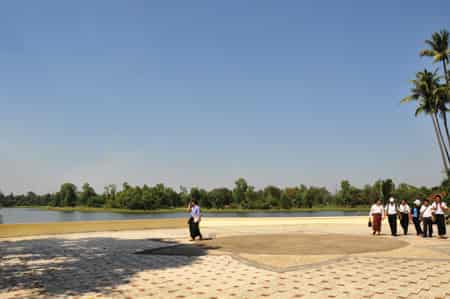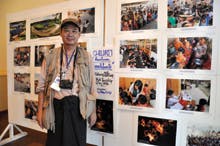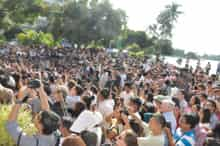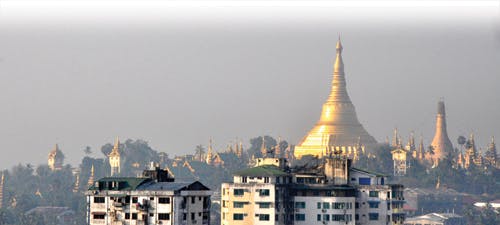
There are momentous events in life which one never forgets. The personal, of course, we all experience, but when one’s path crosses with something that is far far greater and more significant than what is the norm in one’s own small world, it ignites a charge, like being plugged into an artery of tremendous force. Mourning Yitzchak Rabin at what is now Rabin Square along with what seemed like hundreds of thousands of Israelis in 1995, visiting Tiananmen Square mere days before the massacre in 1988, being stuck in Tripoli during the 1991 Libyan crisis, even handing out Citylife magazines to grinning soldiers in tanks during the 2006 coup: these were some of those moments that made me feel as though I was connected to what is, in everyday life, the elusive connection and recognition of being a part of a greater whole.

So it was with great excitement and anticipation of this feeling that I booked my ticket to Rangoon to join the Irrawaddy Literary Festival. Aung San Suu Kyi, released from house arrest in 2010, would be the event’s patron. Along with 130 Burmese authors, who I sadly didn’t know (yet), there were some great literary giants I was dying to meet. Held in the Inya Lake Hotel, with its sweeping manicured grounds, a few bends and turns down the shores from the place where The Lady spent 15 years under house arrest, the event’s significance was obvious.
The first familiar face I saw when I walked into the hotel lobby was that of Chiang Mai resident Sarah McLean, ex-director of the Indochina Media Memorial Foundation, and my first, and just about only, boss. She had hired me as an interpreter for Southeast Asian journalists when I was 23, and I had just been reading an article in the in-flight magazine written by her husband, Denis Gray, Chief of Associated Press’s Bangkok Bureau. This was shaping up to be fun! We gushed over the festival’s programme while sipping coffee before heading off to choose from a variety of rooms holding a jealousy-inducing abundance of seminars, panel discussions and talks – some by literary giants.


My favourite talk of the day was hosted by the Orwell Society, a panel discussion by Jean Seaton, the director of the Orwell Prize, and Oxford lecturer and historian Timothy Garton Ash, who used Orwell to draw stark parallels with Burma’s military regime, comparing 1984’s euphemistic Ministry of Truth to the insidious cruelty of Burma’s similarly euphemistic, and recently dissolved, State Law and Order Restoration Council (SLORC). He read excerpts, and engendered ballroom-wide sniggers, from the New Light of Myanmar, saying how wonderfully Orwellian it was. When asked by a reporter from the FT to what standards journalists should hold the hugely popular, but now political, Aung San Suu Kyi, he didn’t hesitate before saying, “go back to Orwell and tell it as it is,” to great applause.
Seaton ended the talk by saying that the struggle for clear language is up there with the struggle for clear water. A poignant end to a talk which resonated with relevance.

“If you read enough books, then people never surprise you,” said Suu Kyi. “It teaches you about human nature. I read to appreciate the difference.” She went on to give advice on reading: “Read opinions which are different from your own, read things which do not make you comfortable or support your views. Human nature tries to justify your ideas and your views by finding others to back it up, and this is a concern. The internet, for instance, however vast, brings the similar together. Instead of bringing differences into understanding, it creates communities of difference. Reading can mitigate this.”
She went on to explain that under house arrest, reading helped keep her mind sharp and was her connection to the outside world. She added charming anecdotes, describing how one of her favourite pastimes during house arrest was fantasising about the perfect house in which to be under arrest: “It would have a garden surrounded by such high hedges that I could do anything I wanted without the guards seeing me.”
She returned to the exigency of reading time and again. “I don’t just read for fun, I take it seriously,” she said. “Reading is important to me and what I read is more so. I mull over certain expressions, I wonder why a writer says something and why characters do what they do. You may be surprised to know that my favourite genre is the detective novel. It better helps you work out who the villains are. And now that I am the chair of the Law and Order Council, I know a lot more about the law and courts!”
She went on to say that under house arrest, new books were so rare for her that the first thing she would do on receiving one would be to put her nose in and smell it. “I tried to memorise an entire volume of poems last time I was under house arrest, and can quote one from Vikram Seth,” (who, sitting alongside her on the panel, looked visibly touched, and later said that he left the panel and had to go call his parents to tell them about Suu Kyi’s anecdote), but she went on to say that she was not quite able to finish it. “I was released a little too early,” she said drolly.
When asked if she was to write about Burma, what medium she would use, she responded, “I hope that our nation will be a nation worth writing poetry about.”
As to her favourite book, it was a tough decision. “This Desert Island Literature is not hypothetical for me,” she deadpanned.
Jung Chang, whose mint green tome was in my hands (as well as just about everyone else’s), on the tube as I shuttled to and from art college in London the summer I was 20, was one of the authors I was most excited to hear from. Her Desert Island book was also not an academic choice. At the start of the Great Famine in 1968, she was ripped from her family and sent to become a peasant in the mountains near Tibet. Her brother managed to smuggle her a forbidden copy of Turganev’s First Love, and she can still quote the tragic novella word for word.
I shamed myself during Jung Chang’s talk when realising that I was sitting next to her husband Jon Halliday and fan-girling so hard he had to (very politely) ask me to keep my gushing until after the talk.

It all came home to me while I was admiring an exhibition of photos featuring a Kachin children’s refugee camp (where over 2,000 children are cared for while their parents are off in the jungles fighting, and perhaps being slaughtered) and bumped into the familiar-faced photographer, Htein Win, who had just returned to Rangoon from Kachin State. It turned out that he was my after-work beer buddy from my first job with IMMF all those years ago. We greeted each other with great surprise and joy after a decade and a half pursuing our own careers on either side of the border. It was heartbreaking though, to learn of the arrests and other challenges he had suffered through over the years as he pursued his passion for photojournalism.
I bumped into a mother of a Canadian intern we had at Citylife a few years ago, who had been working in Burma with the Kachin for the past 12 years. She was wearing a Kachin sarong and told me, “I debated wearing this, but thought that this is who I represent, this is who I am. We can taste freedom now, and it tastes so good.”
Overall, there was an elated and energised air to the festival. During the talk by Vikram Seth – an utterly delightful and erudite man – a baby in the crowd wouldn’t stop crying.
One would have thought that there would be tut-tuts and frowns at the least, with the baby and its mum being thrown out at the worst, but the crowd happily listened on and Seth at one point applauded the baby, suggesting that it had the good sense to agree with him. After the hour, as with all other talks, he stepped aside to sign copies of his books. When it came to my turn, he produced a small empty bottle of vodka and said he regretted not being able to share it, but he had finished it during the lecture. I was a tad shocked to learn that one of the wittiest and most intelligent talks I had heard in years was made by a man who was half cut. But as he had told us earlier, “When I write, I get into bed with a plain-coloured duvet, no flowers for distraction, a laptop and a bottle of vodka.” I suppose that if Smirnoff can help him produce The Golden Gate, then a short QandA with the same medicine would have been a walk in the park.
“The internet, for instance, however vast, brings the similar together. Instead of bringing differences into understanding, it creates communities of difference. Reading can mitigate this.”
But of course this was no normal book festival. At the end of the day, politics oozed through every conversation, sizzling off each dialogue like the hot Rangoon sun. Even Suu Kyi, who made a point at the beginning of her talk to say that she was here to discuss literature, not politics, had to wryly admit at a later point that she lived and breathed politics and therefore it was hard to disconnect from it, as she slipped in one politically insinuated statement after another.
The fact that we were all there talking about war, ethnic suppression and cleansing, censorship, dictatorship, famine, prisoners of war and other highly charged subjects – at one point ex-BBC Correspondent Fergle Kean laughingly said that the last time he stayed at this hotel he was posing as a water filter salesman while the military rulers lived and roamed in houses not far down the road, was something of which we were all very aware.
We bore witness to an event which marks an as yet shapeless phase of transition from Burma’s painful past to its elusive yet tentatively hopeful future. Its direction is yet unknown, but writers and readers together were able to express themselves through literature, the medium that linked us all, creating dialogue, generating questions and even supplying a few answers.
To have been there, when lovers of words came together to celebrate the end of silence, was simply exhilarating.

